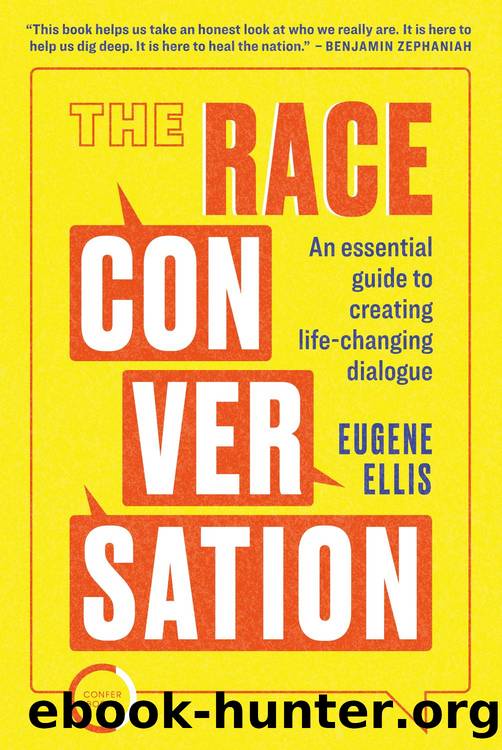The Race Conversation by Ellis Eugene;

Author:Ellis, Eugene;
Language: eng
Format: epub
Publisher: Confer Ltd
Published: 2021-11-15T00:00:00+00:00
Johann Friedrich Blumenbach, a disciple of Linnaeus and a prominent German anatomist, believed, unlike his contemporaries, that other races could transform themselves to meet the European standard. He defined Europeans as the original and perfect form, from which humans developed into other forms. Humans, then, started with the European form, then developed through to the American Indian form, through to the Malay form (the Polynesians and Melanesians of the Pacific and the aborigines of Australia) and then into the African form. In order to accommodate the conception of other races transforming themselves to meet the European standard (a conception that moved beyond Linnaeusâ simple descriptions of race based on geography), Blumenbach had to conceive of a fifth category, the Malay, which Linnaeus did not recognise. In 1795, Blumenbach wrote a dissertation called On the Unity of Mankind, which is considered the starting point for anthropology, where he ascribed the term âCaucasianâ to the European race. He believed that the people of the Caucasus Mountains, a small mountainous region between the Black Sea and the Caspian Sea, which comprises Georgia, Armenia and Azerbaijan, were the most beautiful and geographically close to the supposed Middle Eastern centre of human creation. Blumenbachâs class of Caucasian included most Europeans, North Africans and Asians as far east as the Ganges Delta in modern India.
Although the writings by Bernier, Linnaeus and Blumenbach had concerned themselves with psychology and anthropology, political philosophers were contemplating the rights of the individual and ideas of liberal freedom. John Locke, an English philosopher and physician, famously stated that âall men are equal as self-evidentâ (Locke, 1821). These words might remind you of the constitution of the USA and, indeed, Locke had a significant impact on popular eighteenth-century social and political thought that eventually led to the development of American constitutional democracy. Locke, by any measure, was a powerhouse of humanitarian thought. In 1821, Locke anonymously published Two Treatises of Government. He was concerned with the development of a just and ordered society based on reason and consent, including the idea of creating a civil society. On the issue of race, however, his ideas of reason and consent become both confusing and self-contradictory. The very prescriptions he was arguing for, of life, liberty and the pursuit of happiness, with sleight of hand, he did not apply to all of humanity.
In book I of Two Treatises on Government he opens with a sharp critique of slavery noting that âSlavery is so vile and miserable an estate of man, and so directly opposite to our nation; that it is hardly to be conceived, that an Englishman, much less a gentleman should plead for itâ (Locke, 1821).3
In The Second Treaties on Civil Government, in the rather slender chapter on slavery, Locke paradoxically notes that the condition of slavery can exist as a âstate of war continued, between a lawful conqueror and a captiveâ (Locke, 1821).4 There are strident arguments from many quarters about whether or not Locke was advocating for or against chattel slavery. What
Download
This site does not store any files on its server. We only index and link to content provided by other sites. Please contact the content providers to delete copyright contents if any and email us, we'll remove relevant links or contents immediately.
Spare by Prince Harry The Duke of Sussex(5197)
Machine Learning at Scale with H2O by Gregory Keys | David Whiting(4313)
Fairy Tale by Stephen King(3399)
Will by Will Smith(2920)
The Bullet Journal Method by Ryder Carroll(2573)
Hooked: A Dark, Contemporary Romance (Never After Series) by Emily McIntire(2555)
It Starts With Us (It Ends with Us #2) by Colleen Hoover(2367)
Rationality by Steven Pinker(2366)
Can't Hurt Me: Master Your Mind and Defy the Odds - Clean Edition by David Goggins(2342)
Friends, Lovers, and the Big Terrible Thing by Matthew Perry(2230)
The Becoming by Nora Roberts(2203)
Love on the Brain by Ali Hazelwood(2078)
A Short History of War by Jeremy Black(1848)
HBR's 10 Must Reads 2022 by Harvard Business Review(1845)
The Strength In Our Scars by Bianca Sparacino(1844)
A Game of Thrones (The Illustrated Edition) by George R. R. Martin(1746)
Leviathan Falls (The Expanse Book 9) by James S. A. Corey(1745)
515945210 by Unknown(1667)
Bewilderment by Richard Powers(1621)
